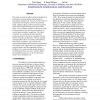Free Online Productivity Tools
i2Speak
i2Symbol
i2OCR
iTex2Img
iWeb2Print
iWeb2Shot
i2Type
iPdf2Split
iPdf2Merge
i2Bopomofo
i2Arabic
i2Style
i2Image
i2PDF
iLatex2Rtf
Sci2ools
113
click to vote
HAPTICS
2002
IEEE
2002
IEEE
Haptic Feedback and Human Performance in a Dynamic Task
This study explores the effects of haptic feedback on performance and learning by human subjects executing a dynamic task. We present the results of experiments involving the control of a ball and beam. Human subjects perform position targeting of the ball through hand operation of the beam angle. In our dynamic analysis we discuss how this prototype task may be used to test the efficacy of various haptic feedback conditions. We obtain results for two conditions of haptic feedback, produced using two ball sizes, and apply various metrics to analyze performance. We also examine ordering effects that occur in the presentation of these haptic conditions. Our analysis and experimental findings indicate that the performance of a dynamic task is governed by the complexity of system dynamics and the magnitude of haptic feedback. Our results provide modest support to recommend exposure to a more complex, higher force-feedback task prior to the execution of a simpler lower feedback task.
Dynamic Task | Haptic Feedback | Haptic Feedback Conditions | HAPTICS 2002 | Human Computer Interaction |
Related Content
| Added | 14 Jul 2010 |
| Updated | 14 Jul 2010 |
| Type | Conference |
| Year | 2002 |
| Where | HAPTICS |
| Authors | Felix Huang, R. Brent Gillespie, Art Kuo |
Comments (0)

